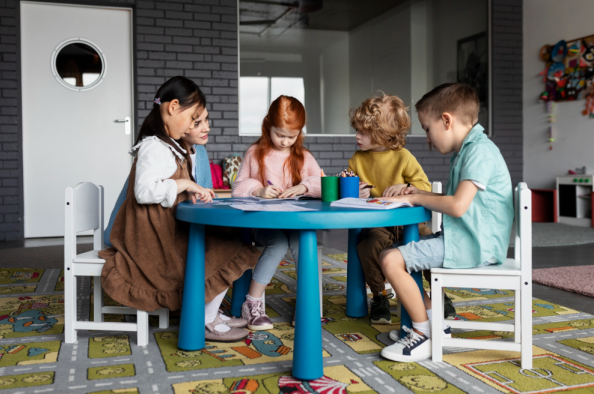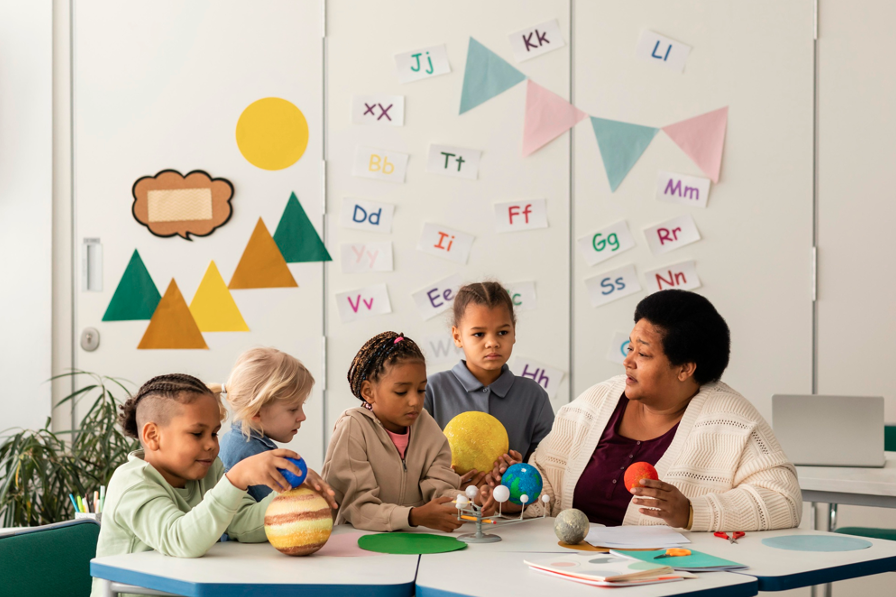Introduction: Choosing More Than Just a Preschool
For many Phoenix families, selecting a preschool isn’t just about convenience or proximity—it’s about setting the foundation for lifelong learning and confidence. With so many options available, parents are seeking programs that focus on the whole child—socially, emotionally, intellectually, and even linguistically.
That’s where Montessori education stands out. Developed more than a century ago, the Montessori method continues to be one of the most trusted educational approaches worldwide. At Beibei Amigos Preschool in Phoenix, we take it even further—offering a nurturing, bilingual Montessori environment where children learn by doing, exploring, and growing at their own pace.
If you’re wondering what makes Montessori—and Beibei Amigos—so different from traditional preschools, this article walks you through everything you need to know: the philosophy, classroom experience, benefits for children, and how to find the right Montessori school for your family.
What Is Montessori Education and Where Did It Begin?
Dr. Maria Montessori and Her Educational Philosophy
The Montessori method was developed in the early 1900s by Dr. Maria Montessori, an Italian physician and educator. She believed that children learn best when they are free to explore in a thoughtfully prepared environment. Her work emphasized respect for the child, freedom within limits, and individualized learning.
Dr. Montessori observed that children are naturally curious and capable when given the right tools and guidance. Her ideas revolutionized early education and have stood the test of time—especially as parents and educators recognize the importance of self-directed learning and emotional development.
Core Values of Montessori: Independence, Respect, and Curiosity
Montessori education is grounded in three essential values:
- Independence: Children learn to care for themselves and their environment.
- Respect: Teachers guide rather than instruct, fostering mutual respect between child and adult.
- Curiosity: Lessons are designed to spark a love for learning rather than meet academic quotas.
These values are at the heart of the Beibei Amigos approach and influence every part of the school day.
The Global Spread and Modern Application of Montessori Principles
Montessori is not just a niche philosophy—it’s a globally respected approach found in more than 140 countries. From private preschools to charter and public programs, Montessori classrooms serve children from infancy through adolescence. At Beibei Amigos, these timeless principles are adapted to meet the needs of today’s diverse Phoenix families.
How Montessori Differs From Conventional Early Education
Traditional preschools often follow rigid lesson plans, structured by age, where the teacher directs activities. In contrast, Montessori classrooms are child-led. Students choose their own activities, work at their own pace, and are encouraged to problem-solve independently. This nurtures both self-confidence and a deep sense of responsibility—qualities that benefit children for life.
How Montessori Looks in a Real Phoenix Classroom
Hands-On Learning With Authentic Montessori Materials
Montessori classrooms are filled with specialized materials—beads for counting, sandpaper letters for writing, and tools for practical life skills like pouring, buttoning, and food prep. These materials aren’t toys; they’re carefully designed tools that promote cognitive, sensory, and fine motor development.
At Beibei Amigos, our bilingual guides (teachers) use these materials to create a multi-sensory, immersive learning experience that builds real-world skills.
Mixed-Age Group Dynamics and Peer Mentoring
Montessori classrooms typically include children in three-year age groupings (e.g., ages 3–6). This allows younger students to learn from older peers, while older students reinforce their knowledge by mentoring younger ones. The result? A stronger sense of community, empathy, and cooperation.
Beibei Amigos classrooms thrive on these natural mentorship dynamics, helping children become more socially confident and emotionally aware.
Child-Led Exploration Instead of Teacher-Led Instruction
In a Montessori classroom, the teacher is a facilitator, not a lecturer. Instead of standing at the front and directing the group, the guide observes and supports each child’s unique interests and learning path. This child-led model fosters independence, intrinsic motivation, and a deep love of learning.
Learning Areas: Practical Life, Sensorial, Math, Language, Cultural Studies
Each Montessori environment is divided into key learning areas. Children can move freely between them, working at their own pace:
- Practical Life: Pouring, sweeping, food prep, self-care
- Sensorial: Texture, color, shape, and size exploration
- Math: Beads, blocks, and number rods for understanding concepts
- Language: Phonics, reading, and writing development
- Cultural Studies: Geography, science, music, and global traditions
At Beibei Amigos, these areas are seamlessly integrated with our Spanish immersion program, helping children build language skills through meaningful, hands-on activity.
Benefits Unique to Montessori Preschool Students
Emotional Regulation and Social-Emotional Growth
Montessori environments emphasize grace, courtesy, and mindfulness. Children learn how to express emotions, resolve conflicts peacefully, and work cooperatively with others. This early emotional intelligence helps build stronger friendships and smoother transitions to elementary school.
Strong Foundation in Concentration and Focus
Montessori students engage in uninterrupted work cycles, often spending 30 to 60 minutes on a single task. This fosters deep concentration, patience, and perseverance—skills that serve them well in future academic settings and daily life.
Development of Intrinsic Motivation and Responsibility
Rather than working for stickers or praise, Montessori children develop intrinsic motivation—the internal drive to complete tasks because they find them meaningful. This leads to better long-term academic performance and a deeper connection to their work.
Greater Autonomy in Everyday Tasks
From tying shoes to washing dishes, children in Montessori classrooms gain confidence by mastering daily life skills. They develop a sense of control and purpose, which leads to increased self-esteem and a positive self-image.
Whole-Child Development Over Academic-Only Focus
Montessori isn’t just about letters and numbers. It’s about helping children grow into confident, compassionate, independent people. The focus on social, emotional, physical, and intellectual development ensures each child is supported in every way.

Why Phoenix Parents Are Choosing Montessori Over Traditional Preschool
More Individualized Learning Paths
Montessori teachers carefully observe each child and tailor lessons to their developmental needs. This allows children to progress at their own pace—whether they’re ahead in reading or just beginning to explore numbers.
Nurturing Environment for High-Potential and Sensitive Learners
Montessori classrooms are especially well-suited to gifted or sensitive children who may not thrive in large, noisy, or highly structured settings. The calm, respectful environment helps all children feel safe and heard.
Structured Freedom That Fosters Independence
While Montessori offers plenty of freedom, it’s always within boundaries. Children choose their work, but they also learn responsibility, accountability, and how to manage their time. This balance is one of the method’s greatest strengths.
Cultural and Language Exposure in Montessori Settings Like Beibei Amigos
Beibei Amigos stands out as a bilingual Montessori preschool, offering Spanish immersion alongside core academic and developmental work. This exposure helps young learners build bilingual skills, cultural awareness, and global empathy—critical skills for today’s interconnected world.
Alignment With Parenting Values (Respect, Empathy, Mindfulness)
More parents today are embracing respectful parenting and child-led learning at home. Montessori aligns perfectly with these values, creating a seamless bridge between school and family life.
What to Look for in a Montessori Preschool in Phoenix
Certified Montessori-Trained Educators
Not all “Montessori” programs are authentic. Look for schools with teachers certified by reputable organizations such as AMS (American Montessori Society) or AMI (Association Montessori Internationale). At Beibei Amigos, our guides are Montessori-trained and experienced in both education and early childhood development.
Prepared Environments That Foster Independence
An authentic Montessori classroom should be calm, organized, and child-scaled. Materials should be neatly arranged and accessible so children can choose and return items on their own. Look for classrooms that promote order, calm, and independence.
Integration of Bilingual or Multicultural Experiences
At Beibei Amigos, our curriculum integrates Spanish into the daily classroom experience. From songs and stories to conversations and lessons, language becomes a natural part of every child’s learning process, not an isolated subject.
Parent Involvement Opportunities
The best Montessori schools actively involve parents. Beibei Amigos offers events, parent education nights, and regular communication to ensure families feel engaged, informed, and supported throughout their preschool journey.
Consistency With Core Montessori Values
Finally, listen to your gut. Does the school feel respectful? Calm? Purposeful? Do the teachers speak to children with kindness and respect? True Montessori programs live out the philosophy—not just in materials, but in relationships, routines, and school culture.
Conclusion: Building Brighter Futures—The Montessori Way
At Beibei Amigos Preschool in Phoenix, Montessori isn’t just a teaching method—it’s the way we see children. We believe every child deserves to be treated with respect, given the freedom to explore, and supported in their unique journey of growth.
With a bilingual, nurturing environment grounded in authentic Montessori principles, we help children build not only academic foundations but also confidence, empathy, and a lifelong love of learning.
If you’re looking for something more than worksheets and busy work—if you want your child to be seen, heard, and celebrated—then Montessori may be the path for you. Visit Beibei Amigos and discover what makes our preschool experience truly special.

